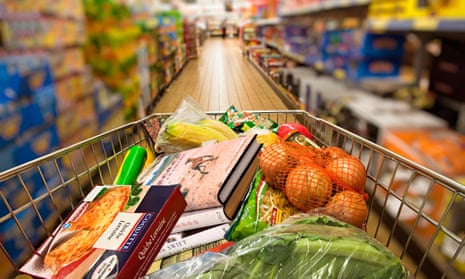British consumers are bracing themselves for an expensive and uncertain post-Brexit future, with four out of five fearing price rises on household essentials such as food, drink and clothing, a survey has revealed.
Eighty-three percent of Britons admit they are concerned about price hikes in goods and services, while 59% are most worried about the soaring cost of groceries, according to a poll for Mintel’s 27th annual British Lifestyles report. Spiralling holiday costs are a concern for 35%, with 26% fearing higher prices for clothing and shoes.
As shoppers have become used to ultra-low food prices following several years of deflation, impending price rises could prove painful for household budgets, the report warns. The slump in the value of sterling following the Brexit vote last June has pushed up the prices of imports, especially of food and clothing.
With food prices widely expected to increase in 2017, average spending on grocery shopping looks likely to increase unless shoppers find ways to maintain spending through trading down or reducing waste.
Britons have also become less materialistic, the report notes, prioritising spending on leisure activities and experiences over material possessions in what is dubbed “the experience economy”.
Despite political turbulence following the vote to leave the EU, Mintel said consumer spending edged up 3.7% last year to £1.2tn. While growth was seen in nearly all the 17 sectors tracked by Mintel, it was notably lower across all fast-moving consumer goods markets, reflecting supermarket price wars and the impact of discounters Aldi and Lidl. By 2021, it is projected that Britons will spend £1.4tn per annum – equivalent to 17% growth over the next five years.
Beyond concerns over rising prices, Britons are also fretting about “bigger picture” issues. The research (from an online poll of 2,000 people aged 16 and over) was carried out in February before Theresa May called the snap general election. But as many as 81% of UK consumers are concerned about the future health of the NHS, while 68% are worried about the UK economy and 67% are nervous about the state of the environment.
In contrast, less than half of all adults (48%) are worried about their ability to pay the bills and less than two in five (37%) are concerned about the burden of personal debt.
“Our research underlines particular concern about the rising cost of in-home food, and inflation is undoubtedly going to squeeze household budgets,” said Jack Duckett, the senior consumer lifestyles analyst at Mintel. “However, broader consumer confidence is still relatively strong. Despite rising prices, most people still expect their finances to hold up well over the next year. It’s the bigger picture issues that the UK faces, such as the NHS and the economy, that are the main concern, rather than people’s own finances.”
Unpicking some notable trends, the report highlights the impact of consumers’ shift towards healthier eating. Fresh fish, nuts, popcorn and “free-from” foods were all star performers with sales increases in 2016, while sales of pasta, pre-packed bread and processed poultry and meat all slumped.
The drive to cut sugar in British diets has led to increased sales of bottled water. Half (48%) of bottled water drinkers admitted concerns over sugar had prompted them to make the switch, triggering sales growth of 9% in 2016 to £2.2bn.
Pre-packed bread remains the most troubled segment of the bread and baked goods market, the report noted, with sales in value terms estimated to have fallen by 10% in 2016 to £1.49bn. Declining tea sales are expected to continue – with traditional teabags losing out to green, fruit and herb varieties – while a deluge of cheaper, Nespresso-compatible coffee pods have shaken up the sector for consumers wanting to recreate “coffee shop” versions of their favourite beverage at home.
In beauty products and toiletries, 2016 proved challenging for the hair removal market, the report said, as more young women chose to shun shavers. Mintel’s data shows that 83% of women aged 16 to 24 agree there is too much pressure on women to remove or groom body hair, while sales of shaving and hair removal products fell 5% to £567m.
But savvy Britons keen to get away from it all will be putting more legwork into finding a holiday destination this year, with over half (53%) saying Brexit will force them to look for deals and consider cheaper options such as UK staycations.

Comments (…)
Sign in or create your Guardian account to join the discussion